User Intent Insight – Why One Page Usually Isn’t Enough to Rank
Everyone is promoting user intent these days as a panacea for all that troubles us in content. Even highly respected SEOs are pushing the idea of writing a page that really nails search intent is all you need to rank.
They couldn’t be more mistaken.
In this post we look at why that’s wrong and what’s missing from the equation. It all starts with a false assumption.
Keyword Research is Not Content Strategy
Most search engine optimizers place a great deal of emphasis on keyword research. Creating a list of search terms with the help of at least one keyword research tool is always the first step. Although tactics may vary, the deliverable is always the same – a list of keywords that need to be prioritized.
Prioritization, without fail, always comes down to a combination of volume and ranking difficulty/potential. Some SEOs have more advanced approaches to calculating search volume and potential. A few add in other subjective criteria such as business goal alignment and content creation effort.
But in essence, it’s still the same approach. Create a list of search terms and determine which ones to focus on first.
The major flaw of this method is in discounting the importance of existing content on the site as a ranking contributor. It’s like saying the rest of your site doesn’t matter – its content has no value. Failing to acknowledge this bias leads to frustration and disappointment when a page doesn’t rank, even after using the latest “SEO optimization tricks.”
Google Evaluates More Than The Content On A Page
We know there’s more to organic search performance than merely links and content on the page. I’m talking about specifically about expertise and authority, part of the trifecta making up Authority, Expertise and Trustworthiness (E-A-T).
We know authority is important because Google has six subsections dealing with the issue in their Search Quality Evaluator Guidelines. These guidelines help over 16,000 search quality raters “evaluate search engine quality.”
“You can view the rater guidelines as where we want the search algorithm to go. They don’t tell you how the algorithm is ranking results, but they fundamentally show what the algorithm should do.”
Ben Gomes, Google VP of Search, Assistant and News
The guidelines refer to the “authoritativeness of the creator of the MC [main content], the MC itself, and the website.” They provide a specific example of a website not being an authoritative source for the topic of a page – tax information on a cooking website.
Here, it’s implied that you need a sufficient body of work (content) in order to be considered an authority. That’s why a post about tax information on a cooking website wouldn’t be considered authoritative.
No matter how well that page was written to satisfy search intent, it would never be considered an authority resource. It doesn’t matter how much you optimize the page.
You can build links until Hell, Michigan freezes over. That cooking website will never rank for any term related to tax information.
For a cooking website to rank well for tax-related search terms, it would need a LOT of tax-focused content – so much that it would no longer be a cooking site. It would be a tax information website. Authority comes from a demonstration of your expertise.
Publishing one page on a particular topic will not confer you with expert status. To become an authority figure, you need content, and a lot of it.
Content Marketing Institute has published hundreds of pages on content marketing.

Content-Science has done a similar thing with content science.

For Buffer, it’s social media marketing.

So when you write about highly competitive topics, you better bring your A-game.
Google’s Preferred Intent Isn’t The Only One That Matters
This is the mistake that 95% of SEOs make. They mistakenly believe that satisfying Google’s preferred intent is the secret to ranking success.
Nothing could be farther from the truth.
Your one little piece of content isn’t going to cut it, no matter what optimization tactics you use.
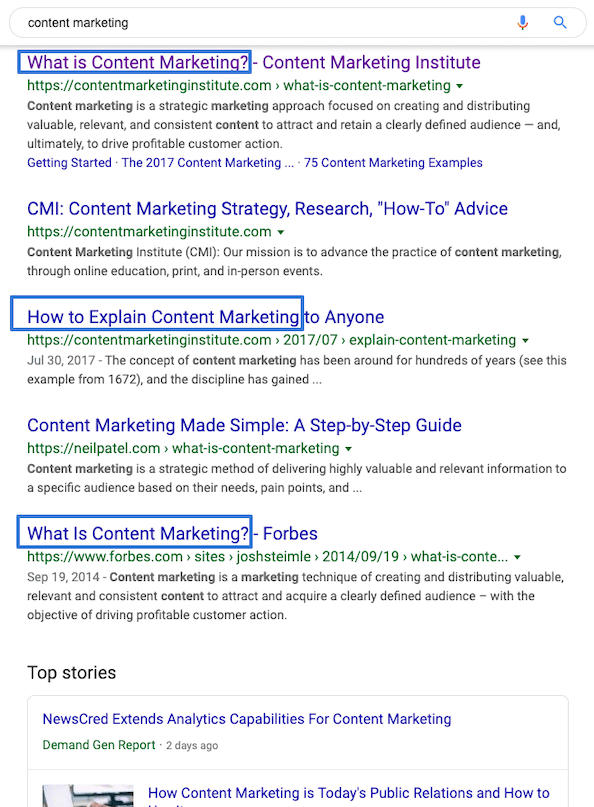
Most SEOs would identify the search intent as a definition, and call it a day. For the search term “content marketing”, just write the best definition and you’re good to go.
But that doesn’t take into account all the other articles that top ranking sites have published to appeal to all the other user intent profiles. Content Marketing Institute isn’t in number one position for the topic “content marketing” because they have the best definition.
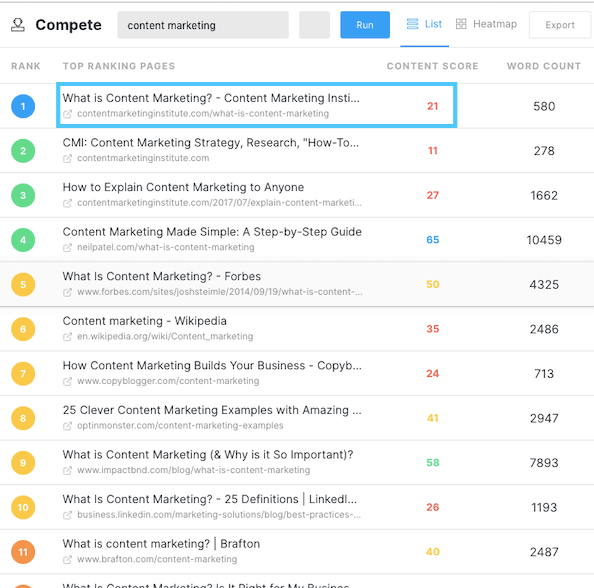
They don’t!
But they have been writing about content marketing for a long time and have published hundreds of articles on the subject.
Imagine if Content Marketing Institute were to write about Invasion of the Body Snatchers, the 1978 remake starring Donald Sutherland.
Not having any published any content on the topic, they’d have no authority.
First they would need to create around ContentTECH Summit, Content Marketing World, and Henry Rollins, a keynote speaker at both events.
Next up would be a content hub on the topic of musicians who act and vice versa. Guess what? Both Henry Rollins and Kiefer Sutherland are on this distinguished list.
And Kiefer Sutherland is the son of… (drum roll please) Donald Sutherland, who starred in the 1978 remake of Invasion of the Body Snatchers. Boom!
Enough with the six degrees of separation.
Creating content outside your realm of expertise and authority is far too difficult, even large sites find it challenging. You’re better off focusing on developing the competence to dominate a very narrow set of topics first.
Publish content that meets all possible intent profiles for a specific topic. Rinse and repeat with other adjacent topics.
Satisfying All Types of Intent is Key to Growing Traffic
If there ever was a secret to SEO and content, this would be it. Meeting the needs of all intent profiles is the proven process to building traffic. Build the infrastructure and linking those related topics together is the not-so-secret sauce.
Let’s use the search term “social media marketing” as an example. We don’t write about social media on the MarketMuse blog.

In fact, we’ve only mentioned it a grand total of four times!
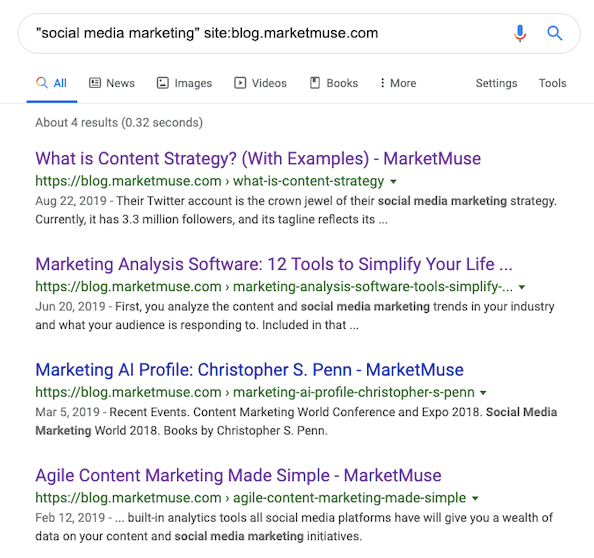
Consequently, our authority on the subject is lacking behind our competitors.
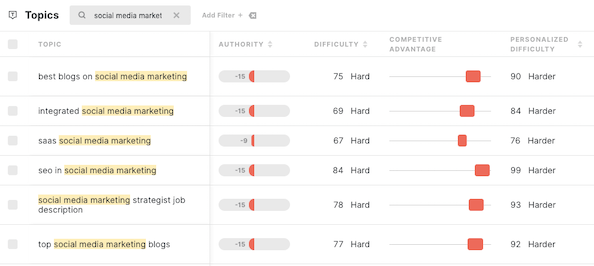
What’s already a hard topic to rank for is made even more difficult due to our blog’s lack of content (expertise) and authority on the subject. It’s not enough to figure out Google’s favored intent for the search term “social media marketing.”
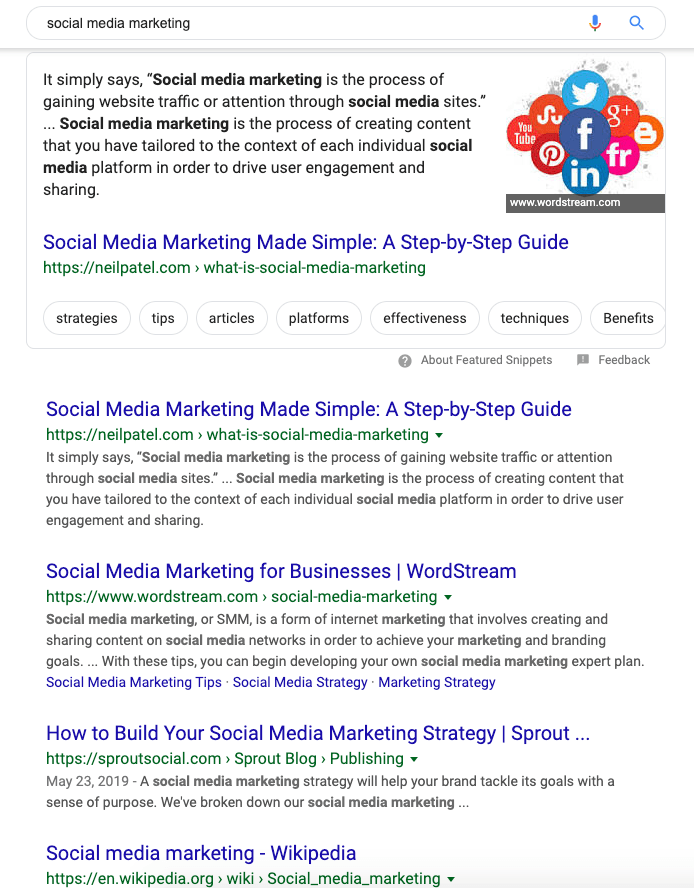
The intent is fractured with search results addressing a number of intents including:
- Tips
- Strategies
- Definitions
It’s a virtual certainty that publishing content for any one of these intent profiles WILL NOT WORK. All the on-page optimization in the world will not move the needle.
That means I need to create content around:
- Social media audiences.
- Using social media for branding.
- Social media strategy.
- Detailed analysis of different social media platforms.
- Different forms of social media content.
Those are my “must-have” topics.
But I won’t stop there. While the competition aimlessly tries the latest over-hyped SEO technique, I’ll be applying some solid content strategy. I’ll also publish additional topical clusters around:
- Social media profiles
- Social listening
- Real-time monitoring
- Influencer marketing
I’ll keep on creating content surrounding these topics and others closely related until there is nothing left to say. At that point I’ll be the Wikipedia in my topic space.
The competition? They won’t know what hit them!
Last Words
Keyword research is not content strategy, no matter how you dress it up. If you’re finding that the latest SEO hack isn’t working, get off that one-trick pony.
It’s time for search engine optimizers to take their SEO bat and go home. They’re not up to playing at the level that’s required in today’s competitive environment.
Content strategy rules!
Stephen leads the content strategy blog for MarketMuse, an AI-powered Content Intelligence and Strategy Platform. You can connect with him on social or his personal blog.